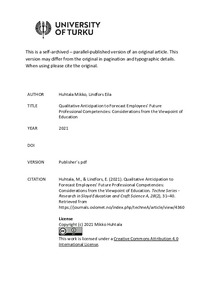Qualitative Anticipation to Forecast Employees’ Future Professional Competencies : Considerations from the Viewpoint of Education
Huhtala Mikko; Lindfors Eila
https://urn.fi/URN:NBN:fi-fe2021120158404
Tiivistelmä
In daily practice, skills enable the professional competencies that are required for successful work. The qualitative anticipation of professional competencies gives information about the knowledge and skills that will be required for the future. Anticipation is challenging in the technical field, since it is easy to consider technological and engineering developments alone. The objective of this study was to get respondents (N=65), professional experts, to think their professional competencies from various viewpoints and across different periods of time using a Janus Cones method. Analysis reaches until the year 2025.
Using thematic content analysis, we identified seven main categories as the components of professional competence in the future of retail automotive services. These are safety and security competence, business management competence, human resource management, vehicle technology, general skills and knowledge, environment and quality competence, and customer service. “General skills and knowledge” was the only component that referred to general competence. The other six categories are clearly contextually bound to retail automotive services, but they might also be usable in other technological and study programs. These results can be used to develop technology education and curricula at various levels of education, especially in automotive education. They also offer information for comprehensive schools as to how working life and professions are changing.
Kokoelmat
- Rinnakkaistallenteet [29337]
